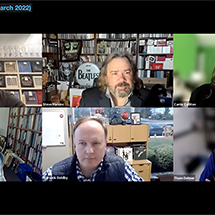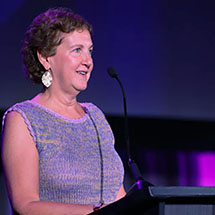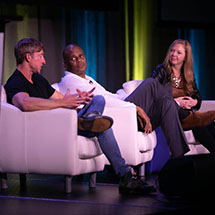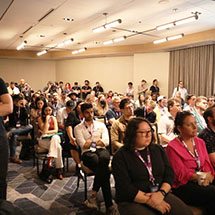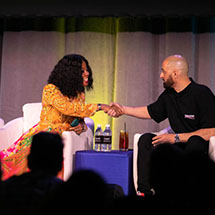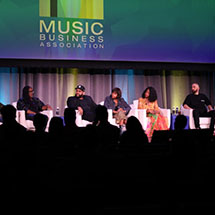The virtual edition of the Metadata Summit gathers thought leaders from the music data, legal, tech & startup communities and beyond to discuss advancements in metadata technologies across the global music business, how to blend industry know-how with technology to best improve data collection & reporting, and ways we can collaborate to keep music royalties flowing to artists & rightsholders.
11:30 – 11:35 AM ET
Welcome & Presenting Sponsor Remarks
11:35 AM – 12:10 PM ET
Keynote: BMLG’s Cutting-Edge Metadata Journey
From Studio to Publishing to Sync, Kautz Has His Finger On The Pulse Of the Latest Music Tech
Andrew Kautz has been one of the entertainment industry’s most effective C-suite executives for over 20 years. Currently, he serves as COO of Big Machine Label Group (BMLG), a small yet powerful global force in today’s music ecosystem. Over the past several years, Kautz — who Billboard has consistency listed as one of Nashville’s top business “Power Players” and Variety has named one of the entertainment industry’s top “Dealmakers” — has led his team in an aggressive pursuit of technology to better document data from the studio to publishing to sync, ultimately bringing credits to the contributors. In this conversation with Edward Ginis, Co-Founder of OpenPlay — a solution that powers workflow and process management for some of the world’s largest entertainment companies — we’ll hear Kautz’s real-world experiences with crediting UGC, cleaning data, claiming splits, and so much more. With his finger on the pulse of data challenges and legitimate tech solutions to ensure proper payments for creators, Kautz is the perfect candidate to help us set the stage for the conversations that will evolve over the three days of the Metadata Summit, as well as inspire attendees in their pursuit of technologies to make data flow more smoothly through the supply chain.
Interviewee
Interviewer
12:10 – 1 PM ET
Linking The Publishing & Recording Data Universes
For a huge number of the operational processes in our industry one of the key pieces of data is an authoritative link between a sound recording (identified by an ISRC) and the musical work(s) that appear on it (identified by an ISWC). There are probably hundreds of databases around the globe that contain such links along with the metadata describing the relevant sound recording and musical work(s), but there will be extensive conflicts between them. Given the highly connected, global market we now operate in, this inevitably causes inefficiencies, delays and misdirection of royalties. This panel will shed some light on what the quality of the data is really like in today’s music industry. We will explore the challenges that arise when considering matching data at scale and discuss how we can improve the matching process to the benefit of the entire value chain.
Moderator
Panelists
1 – 1:15 PM ET
Networking Break
1:15 – 1:45 PM ET
Company Commercials
Have specific questions for these metadata companies? These breakout rooms will allow you to learn more about how they work.
Commercial 1: Bulk Metadata Management — Best Practices When You Need To Edit, Update, and Transfer Catalogues
Presented By Vydia
The needs of your business are growing as you gain momentum. You are quickly signing new artists and songwriters or you have just decided it is time to centralize your entire catalogue with one technology partner. These milestones often require the onboard or transfer of a large amount of content and associated metadata in one fell swoop. After years of helping clients onboard catalogues, we have pinpointed key ways to avoid confusion, incorrect merges, and stressful royalty issues. Leaders from Vydia’s Content Operations and Rights Management teams will walk you through the best practices of bulk catalogue transfers to ensure fast, smooth, and accurate changes.
Presenters:
Stephen Dworkin, Head of Content Operations, Vydia
Sara Munson, Rights Management, Vydia
Commercial 2: How to Maximize The MLC’s Public Database
Presented By The Mechanical Licensing Collective (The MLC)
Learn how to maximize The MLC’s public database which it is charged with maintaining pursuant to the Music Modernization Act.
Presenter:
Dae Bogan, Head of Third Party Partnerships, The MLC
11:30 – 11:35 AM ET
Welcome & Credits Due Presentation
11:35 AM – 12:20 PM ET
Where’s The Blockage: Contributor Data & The Supply Chain
Contributor data is captured early in the creative process via messages such as RIN and tools like Session, Sound Credit and Veva Collect. Where in the value chain is that data being ingested and how is it getting there? What are the challenges in getting this “studio data” where it is needed? In particular, how do we ensure each contributor is attributed with the right role and how is this information managed across the industry?
Moderator
Panelists
12:20 – 12:40 PM ET
Xperi Networking Break
12:40 – 1:30 PM ET
Music Industry & The Creator Economy: Worlds Collide
The entrance of new creator economies is both exciting and perplexing for those working on the data side of the business. Fans can now discover music in a variety of new ways; however, these economies also present a new set of metadata challenges that the industry has not yet dealt with. This conversation is meant to expose some of those data challenges from a new platform and a publisher perspective.
Moderator
Panelists
11:30 – 11:35 AM ET
Welcome
11:35 AM – 12:25 PM ET
Monetizing the Explosion of the Creator Economy
Boom! Hundreds of millions of people are creating new content experiences with music in “games,” personalized short videos, choreographed personalized fitness routines, podcasts, etc. How can we, as the music industry, help these non-traditional creators maximize reach and revenue? What metadata, tools and licensing is needed? And, do we treat each new creation, as a “release” and a “public performance?”
Moderator
Panelists
12:25 – 12:45 PM ET
OpenPlay Networking Break
12:45 – 1:30 PM ET
Nuts & Bolts of Metadata Reporting in an UGC Environment
Given the very nature of UGC platforms, the gathering and communication of music metadata on these platforms, more or less bypasses all the metadata solutions the industry has been investing in over the last two decades. As user-generated content continues to grow, what are the particular challenges and pain points for these services in being able to identify what music has been uploaded so it can be reported in a meaningful way to rights owners? Then, how do rights owners interpret that metadata to ensure the right people get paid?
Moderator
Panelists
1:30 PM ET
Closing Remarks

